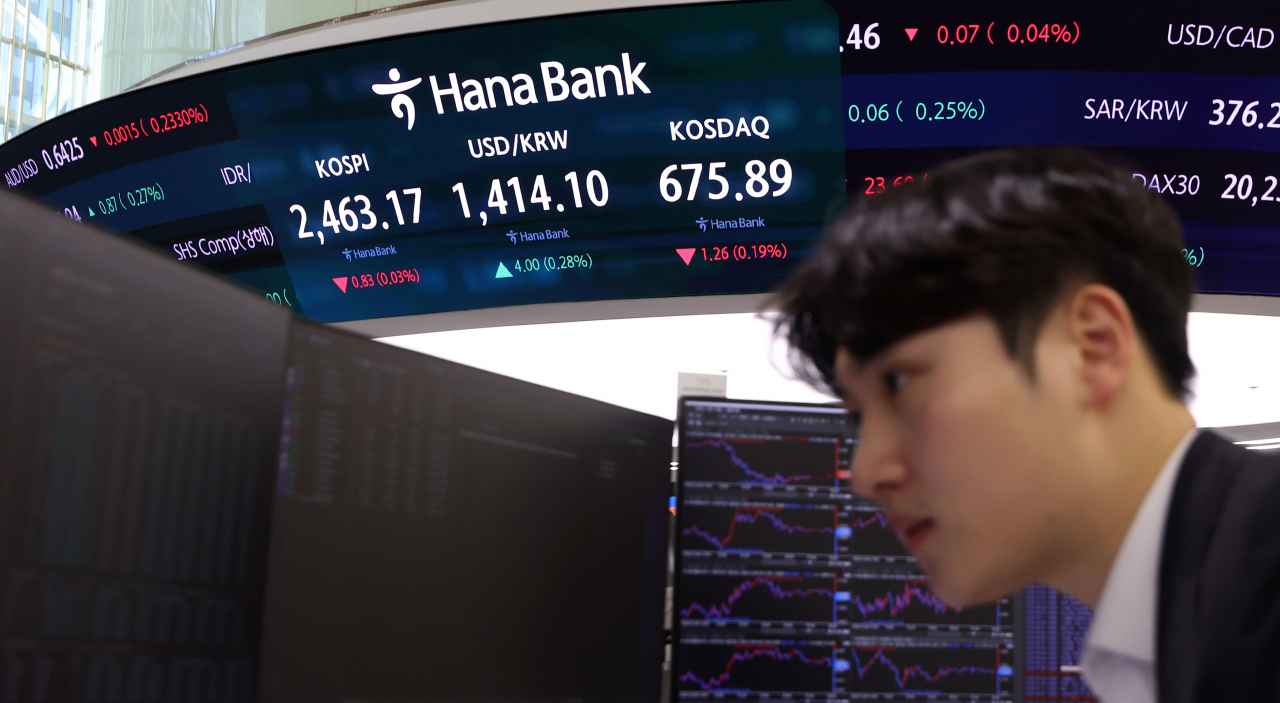 |
An electronic board displays the Kospi and Kosdaq indices, along with the won-dollar exchange rate, in a trading room at Hana Bank's headquarters in central Seoul Thursday. (Newsis) |
South Korea’s stock market was already on fragile ground before President Yoon Suk Yeol’s unexpected martial law declaration further undermined the government’s yearlong push to boost corporate value.
Foreign investors sold a net 200 billion won ($141 million) on the benchmark Kospi within the first two hours of Thursday’s trading, extending the 400 billion won offloaded the previous day after the six-hour martial law announcement. As of 3 p.m., foreign investors had dumped 380 billion won in Kospi stocks and 71 billion won in tech-heavy Kosdaq stocks.
The Kospi closed at 2,441.85 points on Thursday, down 0.9 percent from Wednesday and reaching the lowest in almost three weeks.
The downturn dampens optimism from Tuesday’s rare rebound when foreign investors made net purchases of 564.5 billion won -- the first in six trading days and the largest in three months. Hours later, Yoon’s declaration of martial law -- something that Korea has not seen in 45 years -- plunged the nation into a political crisis before being rescinded six hours later.
Foreign investors have offloaded 19.8 trillion won in Kospi stocks over the past four months, dragging foreign ownership in the index from 35.52 percent to 32.48 percent.
The sell-off has raised further doubts about the government's Corporate Value Up Program, launched in February under President Yoon's leadership to address the chronic undervaluation of Korean stocks. While officials maintain that the program requires time to deliver results, the ongoing outflows signal diminishing investor confidence in its effectiveness.
Some progress was visible in the financial sector. The KRX banking index surged 44 percent from the start of the year through Tuesday, while the KRX securities and KRX insurance indices each climbed nearly 30 percent.
However, these sectors bore the brunt of the recent political upheaval. Over two days, the KRX banking index plunged nearly 10 percent, with Shinhan Financial Group, Hana Financial Group, and KB Kookmin Bank ranking among the top five most-sold stocks by foreign investors on Wednesday.
With the few stocks that had gained amid the ongoing slump now at risk, experts predict the value-up program will lose further momentum.
"The current crisis has raised alarms about the administration’s leadership and its ability to maintain power, undermining the momentum essential for policy implementation," said Kim Yun-jeong, an analyst at LS Securities. "The program, which requires long-term, sustained effort for success, is now facing a new challenge."
Experts also warned of the impact of currency volatility.
On Thursday, the Korean won opened at 1,412.4 against the US dollar, up 2.3 won from the previous day’s closing price. This marked the second consecutive day the won opened above 1,410 won. After Tuesday’s martial law declaration, the won briefly surged past 1,440, reaching a two-year high.
"The continued weakening trend in the won could lead to increased foreign capital outflows. While the situation could shift if stabilization measures are introduced, the current environment remains unfavorable for the stock market," said Kim Dae-jun, an analyst at Korea Investment & Securities.
Kiwoom Securities analyst Han Ji-young predicted the won will likely hover around the lower 1,400s until the political uncertainty is resolved, with the mid- to long-term impact of currency volatility expected to be limited.
A prolonged impact, although at low possibility, is not ruled out, as Yoon's martial law decree saga has turned into national uproar calling for his impeachment. Opposition parties tabled the motion on Thursday, with a vote scheduled for 7 p.m. Saturday.
Market watchers predicted the political situation’s direct impact on the market will be limited, citing previous impeachment cases in 2004 and 2016.
"It was economic fundamentals and external factors, not political developments, that have influenced market interest rates," said Han. "Unless the crisis escalates into sovereign risk, pressure to lower stock valuations is unlikely."
Similarly, LS Securities’ Ha Jang-kwon emphasized that weak fundamentals may be the primary factor weighing on the market now.
"Unlike the previous two cases, when export growth — a key proxy for the Kospi’s price-to-book ratio — was on the rise, that has been declining since its January peak, with November marking the fourth consecutive month of contraction," Ha explained.
Hence, while the recent political turmoil may not directly affect the market, they will inevitably add to the so-called "Korea Discount," eroding foreign investor confidence and hindering market recovery.
Meanwhile, Bank of Korea Governor Rhee Chang-yong on Thursday projected the currency "will gain value gradually if there is no further shock."
"Unlike other major economies, where economic or fiscal issues could trigger government collapse, South Korea’s martial law stemmed purely from political factors," Rhee said Thursday, adding, "With strong economic fundamentals and growth momentum separate from politics, the country’s creditworthiness is unlikely to be significantly affected."
The South Korean government is preparing a combined 50 trillion won in funds to stabilize the stock and bond markets, while pledging "unlimited liquidity" injections. Finance Minister Choi Sang-mok has held emergency meetings with Rhee and other top financial regulators for a third consecutive day Thursday, consistently monitoring and responding to the market.
On Wednesday, Choi sent an emergency letter to financial regulators worldwide, reassuring them that the country’s political, economic and national systems are "operating normally, as before."